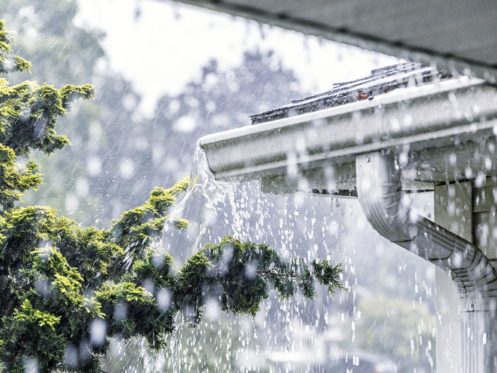Severe weather in New Lennox can cause a variety of problems on the exterior of your home. From torn flashing and missing roof shingles to hail-damaged siding and leaky windows, there are often many issues to resolve. Surprisingly, however, major storms can also cause significant harm to your air conditioner. Although your cooling system is meant to withstand most weather-related challenges, scheduling an air conditioner inspection after any big storm is strongly recommended. The following are five signs that you likely need one.
1. Decreased Efficiency
When air conditioners suddenly become less efficient, this problem typically manifests in the form of rapid and dramatic increases in home energy bills and noticeably reduced home comfort. Lower cooling efficiency following a big storm can be the result of:
- A damaged AC motor
- Problems at the condenser coils
- A refrigerant leak
In many instances in which low output is the result of storm damage, the tubes that carry refrigerant between the indoor compressor and the outside condenser have been compromised by strong winds or by trapped, fast-moving debris. Scheduling an inspection early will keep any existing problems from spiraling out of control. Repair services can both extend the lifespan of your air conditioner and help bring your home cooling bills down to a more manageable level.
2. Your Air Conditioner Won’t Turn On
One very likely sign of AC problems is a system that won’t power on. This storm-related issue is most likely to happen after a sudden power loss. Power surges that occur during blackouts can damage AC equipment irreparably, especially if this equipment isn’t properly installed. Ideally, your cooling system is protected from electrical damages at the circuit breaker. If this is the case, simply reset the circuit breaker. However, if resetting the breaker doesn’t instantly resolve the problem, schedule an inspection immediately.
3. Strange Sounds Whenever the Unit Is On
Strong winds and the considerable amounts of debris that the wind carries can cause issues at the outside condenser unit. When dirt, dust, leaves, twigs, stones, and even branches are forced inside of this unit, they’ll rattle around whenever the system is turned on. You might hear loud buzzing or rattling sounds, or even screeching noises. Some air conditioners are designed to make user maintenance at the outside condenser easy. For instance, if the condenser has an enclosure that you can easily open, you may be able to clear out most or all storm debris on your own.
Check your owner’s manual before attempting to troubleshoot, and always avoid removing any lids or covers that might void your warranty. If you’re unsure of how to safely clean this component, let a licensed HVAC technician do the job for you. When storm-related debris causes the air conditioner to emit strange sounds, a thorough, professional cleaning is always best. These noises likely mean that rocks and other hard or abrasive elements are being knocked into sensitive components at the condenser’s interior. Getting everything out will allow for quieter operations, less wear and tear, and fewer problems down the road.
4. Water Has Pooled Around the Condenser
The outside unit in your home’s air conditioning system is to a degree, designed to be both weather-resistant and water-resistant. However, this equipment is not built to withstand submersion. If a recent storm event has flooded your property or if you’ve got grading, drainage, or landscaping issues that regularly lead to pooling, you may have a multi-pronged problem on your hand.
The first and most important step to take is to turn the system off at the circuit breaker. This will prevent anyone in the area from being electrocuted or shocked. Next, take steps to address the drainage issue. Pooling water can be detrimental to your cooling equipment and to the building’s foundation. Ongoing drainage issues should always be resolved before AC repairs are attempted. Once the standing waters have abated, you can have the condenser inspected and repaired by a licensed technician.
5. The Smell of Burnt Wires or Other Electrical Problems
Electrical problems are often identified by the slightly sweet, burnt smell that equipment emits when damaged. At your air conditioner, a burnt electrical smell may mean that the condenser motor is damaged, or that your equipment has a short circuit. Problems like these can be especially dangerous when there’s also standing water nearby. Be sure to turn the air conditioning system off at the circuit breaker right away, and then schedule an appointment for AC service.
Severe weather can wreak havoc on your home air conditioning system, even during times when you aren’t heavily reliant upon this equipment. At Zark Heating & Cooling, we offer a comprehensive range of HVAC services throughout the greater New Lennox area, including installation, maintenance, and repairs for ductless mini-splits. Call us today to schedule service for your storm-damaged AC or to learn more about some of the outstanding heating and cooling products we supply.


